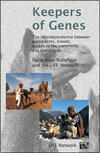
The interdependence between pastoralists, breeds, access to the commons, and livelihoods
This book by Ilse Köhler-Rollefson and the LIFE Network focuses on a key threat to the survival of pastoralists and their livestock breeds: the loss of access to grazing and water. Pastoralists are losing their traditional pasturelands for many reasons – new restrictions on grazing in nature reserves, the expansion of irrigated agriculture, expropriation by settled villagers, and the elimination of fallow land because of intensified cropping.
Less grazing land means that pastoralists cannot maintain a herd large enough to be economic. Many are forced to give up livestock production altogether. That does not just mean the loss of livelihoods for the pastoralists themselves. It also means settled villagers can no longer rely on the hardy stock from pastoralists to pull their ploughs and provide them with meat and milk. And it spells doom for many valuable livestock breeds and the gene pool they represent.
Based on years of research in rural India, this book has wide applicability to other parts of the world where pastoralism is important. It forms a valuable input to the First International Technical Conference on Animal Genetic Resources, to be held in Interlaken, Switzerland, in September 2007.
Download:
Complete book 1257 kb, 80 pages
Text only 355 kb, 70 pages
Cover 996 kb
Photos 324 kb, 8 pages
